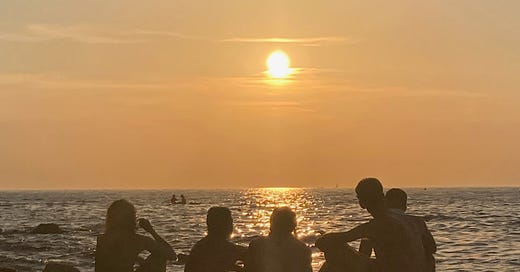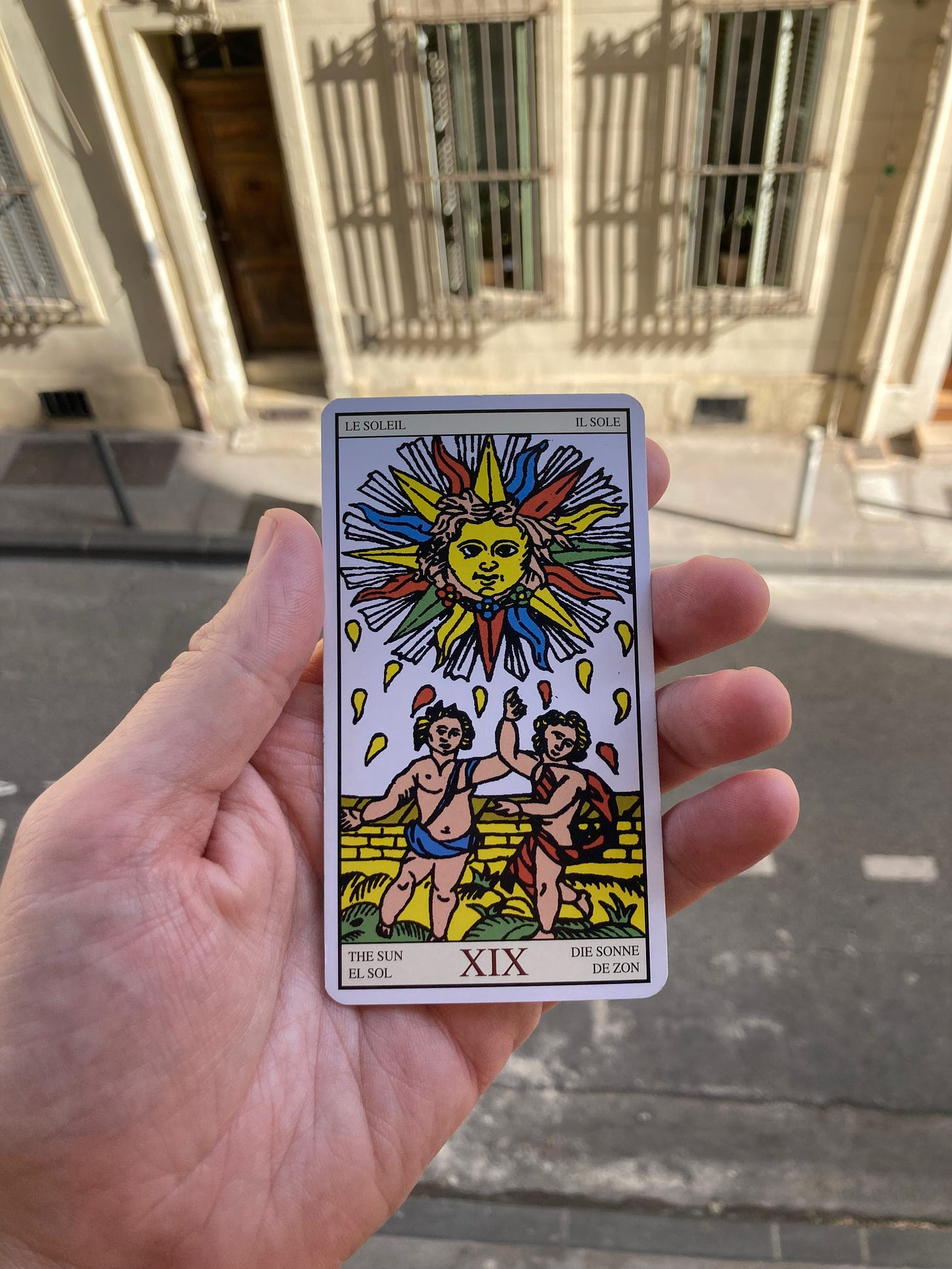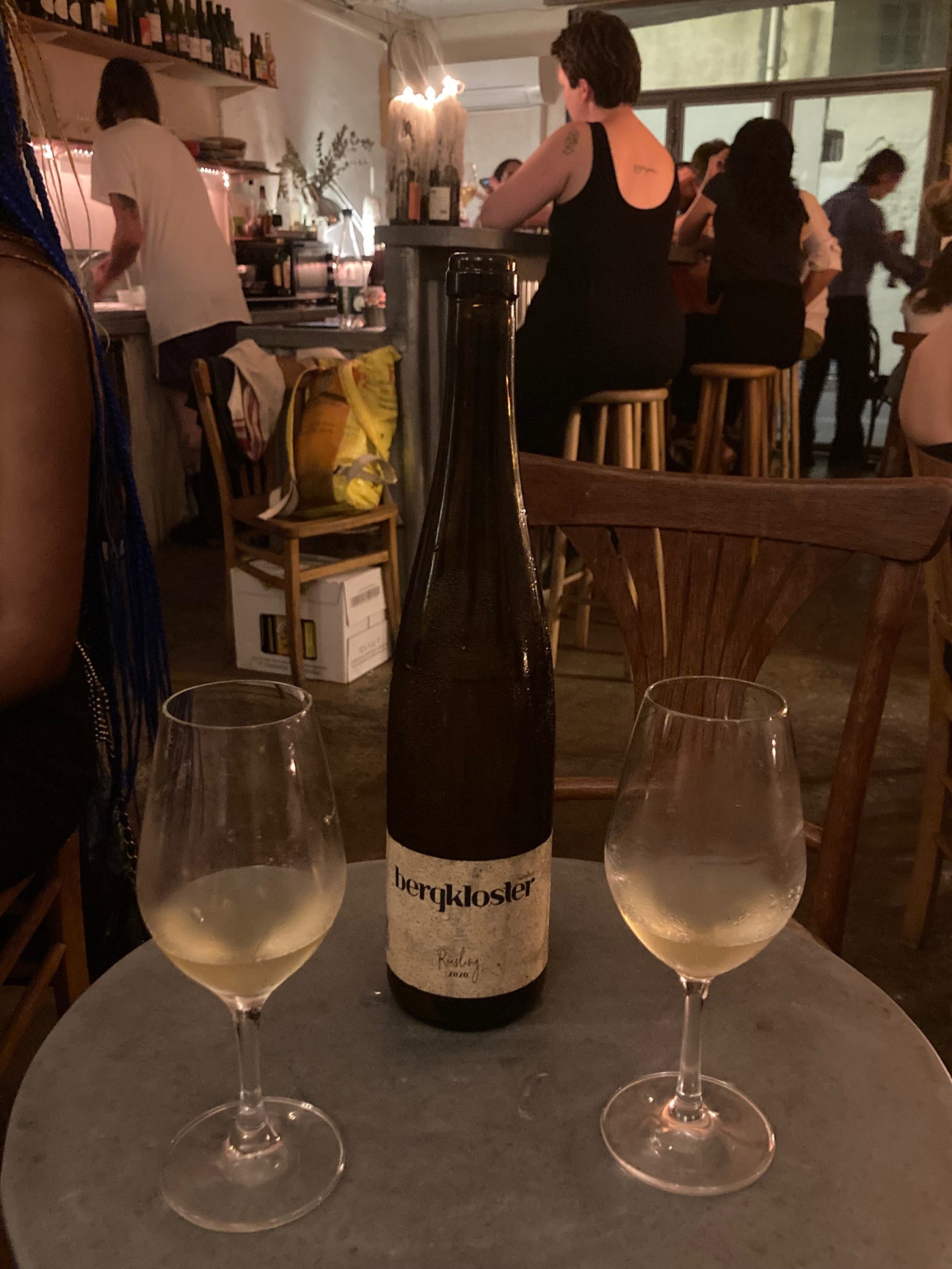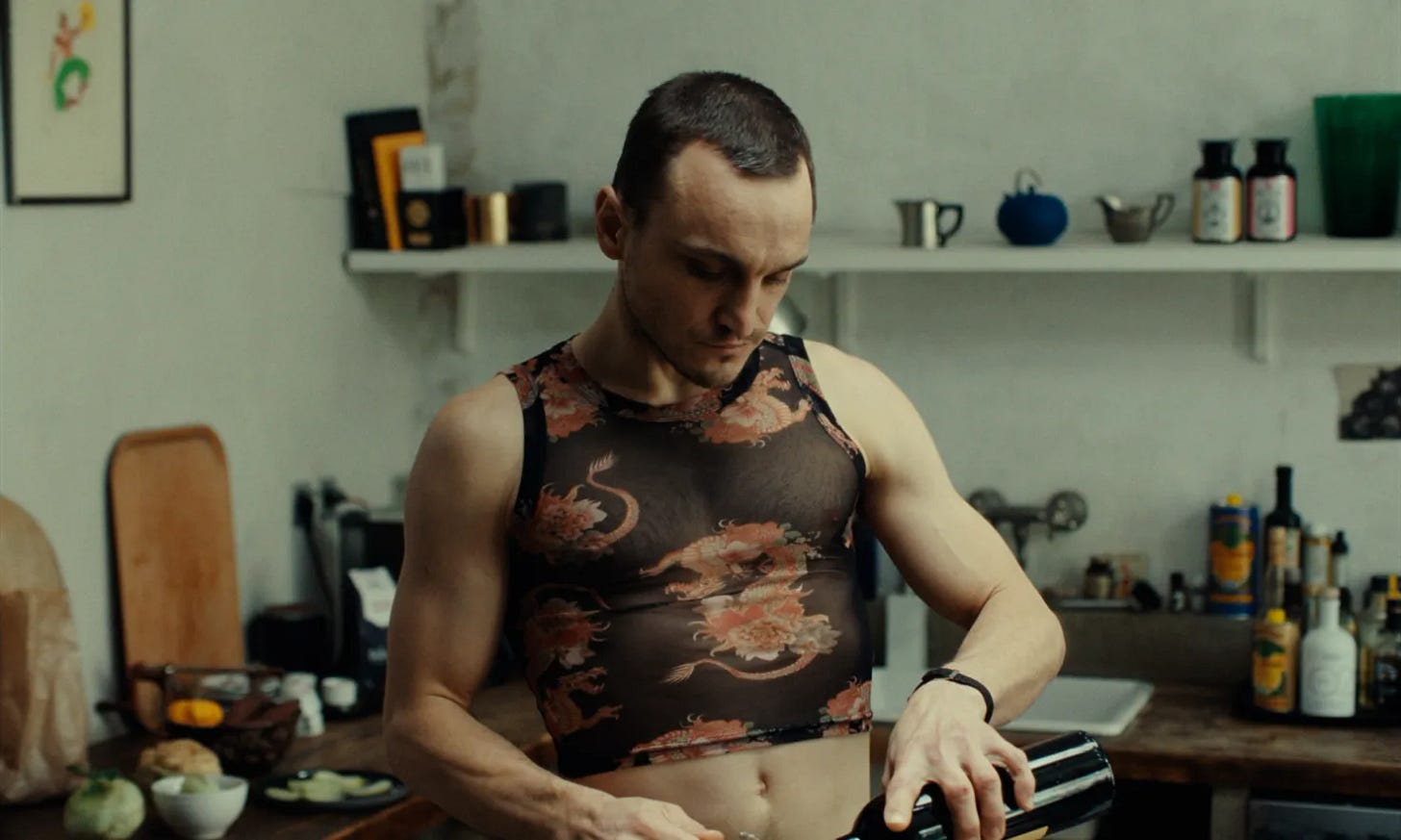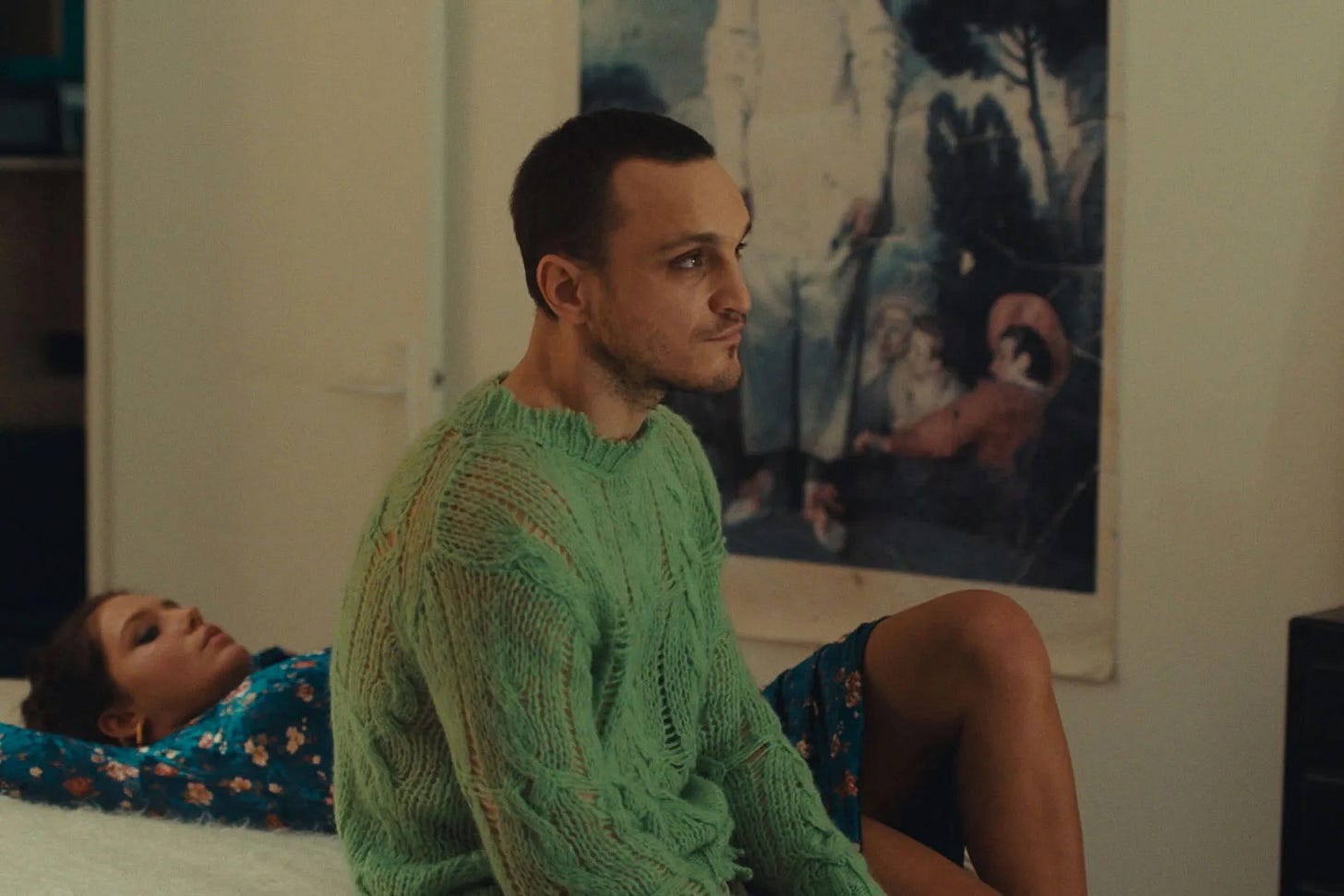This post contains some light spoilers about Ira Bach’s Passages. I still need to post a couple of people your books for subscribing, I haven’t forgotten, I’ve just not known what to do with the substank recently. Other writing has happened: I have a poem for Momtaza in Poetry Project newsletter, an interview with Anahid here, a review of Nour Mobarak’s show, and it’s been so long since I posted here that I don’t think I ever shared my essay on novels and morality for the Tank summer issue, a piece I’m particularly proud of.
In Marseille the sun pounds with a constant 35C such that the only way to do the beach is to plant one’s buttocks in the shade; the city itself stinks of urine and uncollected trash from a recent refuse workers’ strike. This end of August trip was the first time, all summer, that I’d been sweltering, the kind of heat where sweat seeps into your shirt when you don’t move, the only solution is to clasp an ice cube in the skin roll at the back of your neck. On my first morning I draw a tarot card.
Love unravels, unfurls from the spool. When it works you’re threading something beautiful together. Often, you’re left only with the drawing toward and the coming apart. No matter how hard you try, eventually the thread has an end.
Staying in the new apartment of my school friend, Stefan, on the eve of my arrival I take him out for food and wine. I am supposed to be in Greece, or Turkey, or the Canary Islands (my ex avoiding making plans again was the first sign that this was our last run). As soon as I walk through the door of the rustic cavern in Saint-Charles I can tell something is wrong. There are too many Australians in here. It’s like I’m in Hackney.
What wine would we like? I ask for something like a Sauvignon, perhaps a little flinty. “We don’t really sell French wines. Would you try something funkier?” I say yes but I mean no. Why did I choose this bar? I met the owner in London. He told me to come check it out before he sold the place to his employees. I like to do what I’m told.
On the table next to us, Yves starts complaining to Marie about all the English speakers – the lovers incredulous at the lack of French around them. “Not you,” he says, touching my arm. “Why would I leave Paris for this . . . shit? I could drink this shit in Paris. But I am in Marseille.” I want to pretend that I don’t know what he means.
“Biodynamic? Natural? No sulphites? It’s all shit. You pay more, they do less. In France we drink the proper way, in a field with your friends all night . . .” he gestures the motion of glugging from the bottle and then a hammering motion. “ . . . you drink Côtes du Rhône, you feel terrible, you enjoy your life.”
Yves looks like a French Elliot Gould: handsome, wiry, anarchic. Where he is chaotic, Marie is guarded, drawn into herself. He talks too fast and too much. Locked together in love, she rolls her eyes and laughs at his intensity. She goes to the bathroom. I ask him how long they’ve been together. He says just one month. Or that he’s cheating on someone else with her. I can’t tell.
Beginnings and endings overlap. When I met Luis, the owner of the Marseille bar, back in London, he was so in love that he could not concentrate. Luis and Adaline had met unexpectedly. Mild concussion meant that N., my on-off girlfriend of three years, had no memory of having met Adaline before, despite them working in the same studio complex. If I line up the dates, N. was concussed when she told me she wanted to get back together, our hopeful fourth attempt.
Smitten, when Luis, with his Gallic pencil tache, can wrench his face from Adaline’s neck, he tells me about the bar he wants to open in an abandoned swimming pool in Mexico City: “There are no rules there. You can do what you want.” An Irish man at Mexico City International Airport once told me about a French guy in Roma Norte who refused to pay a protection racket for his vintage store. He was found dead in an alleyway.
London. September. I go on a second date. Is it too soon? Beth suggests the cinema, the film, the time, and after three years of trying to make everything happen while N. ran away, it’s such a surprise to be invited anywhere.
The two French couples, their romantic throws, their expressions, their cinematic character, are on my mind as we watch Passages, the latest Ira Sachs film in this London heatwave, delaying summer’s end as I attempt new beginnings. The film is about what love and desire mean for people like me, how unwieldy it all is – in excess of the lover and the beloved. It is also a film about a tank top as a marker of generational difference.
The story captures the upwardly-mobile bohemianism of Tomas, a film-director (Franz Rogowski) and his straining relationship with Martin (Ben Whishaw) when Tomas falls in love with Agathe, a school teacher (Adèle Exarchopoulos). The first time he’s fucked a woman in his open arrangement with his boyfriend, the film is full of hot, slow sex – the location dependent on where Tomas’s belongings reside: Martin’s beautiful apartment or Agathe’s small flat.
I’ve poured my box of popcorn in Beth’s lap, on her demand. Hot. We’ve yet to kiss, just talk a lot. The screen fills with blush egg-shell hues, formica tables, rustic Parisian interior walls, and ochre dive bars, capturing the risks of first love – what I saw in Yves and Marie, and in Luis and Adaline – the self-deception in desiring others.
Acts of love are a duplicitous mixture of control and abandon – Tomas in the editorial suite, svelte in his dishevelled designer sheer, is the perfect container for it. His silences are that of ambivalence around caring for one and wanting to fuck another. His incapacity hurts. Between popcorn bites, my date keeps lip-murmuring “brutal,” raising her eyebrows as Tomas’s behaviour becomes more deranged.
In the same Parisian streets, early July before Hannah and Joe’s wedding, I see the 11th filled with police after the killing of Nahel Merzouk; Two teenage lovers pass a line of riot vans on an electric bike – the girl on the back mouths: Tout le monde déteste la police as she holds on to the boy’s shoulders. When I believed.
Patience exhausts, resentment builds, love unravels.
Sometimes, just when you think you’re approaching the beginning you always desired, you’re reaching the end. Tomas cycles around Paris, Albert Ayler’s Spiritual Unity blasts, its lack of narrative is the perfect expression of his mania. With Tomas being thrown out of two apartments, There’s something inert about this end, a halt to the compulsion of returning to your wounds. While the film is painful to watch, I don’t even know if it’s good. It looks beautiful. The script is thin.
In the auditorium’s silence, is this disappointment I feel from the film merely my own, as I pedal around in my past love? My intolerable August of unravelling. Why did I let someone leave and return to me four times?
We leave the cinema and walk down Bethnal Green Road. The streets are busy with people cramming in the end of summer. Beth plants a shy kiss on my cheek before running away, like an emperor penguin, to board the 108. Another bus will come.
The end of love is the end of a spool. There are multiple rehearsals. Finally it comes: the disappearance of the line that was in your hand. You know what’s not there, even if it’s two weeks after you went to your brother’s wedding together, and she’s phoning to end it from a Greek island, after three years.
In the bar in Marseille, Stefan and I say goodbye to Yves and Marie. and exchange numbers to play pétanque with them (which never happens). I ask the nice bar man about Luis selling the bar to his workers: “Yes it will happen.” “And Adaline? She will go to Mexico, too?” “They broke up already.” “They broke up? But they were so in love?” “They were so in love.” “That’s crazy. It was only a few months ago.” I say. It was only a few months ago for me too. Summer ends no sooner than it’s started.
If you enjoyed this post please share it, like it, or subscribe. I’m very much open to commissions at the moment, too.

